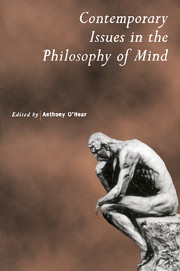Book contents
- Frontmatter
- Contents
- Notes on Contributors
- Introduction
- The Mind–Body Problem After Fifty Years
- How to Find the Neural Correlate of Consciousness
- Embodiment and the Philosophy of Mind
- Folk Psychology and Mental Simulation
- Understanding Other Minds from the Inside
- Self-knowledge: the Wittgensteinian Legacy
- Joint Attention and the First Person
- Consciousness as Existence
- Setting Things before the Mind
- Perceptual Intentionality. Attention and Consciousness
- Experience and Reason in Perception
- Intentionality as the Mark of the Mental
- Intentionality and Interpretation
- Externalism and Norms
- Mind, World and Value
- Mind, Knowledge and Reality: Themes from Kant
- The Modality of Freedom
- Dualism in Action
- Index
The Mind–Body Problem After Fifty Years
Published online by Cambridge University Press: 12 May 2010
- Frontmatter
- Contents
- Notes on Contributors
- Introduction
- The Mind–Body Problem After Fifty Years
- How to Find the Neural Correlate of Consciousness
- Embodiment and the Philosophy of Mind
- Folk Psychology and Mental Simulation
- Understanding Other Minds from the Inside
- Self-knowledge: the Wittgensteinian Legacy
- Joint Attention and the First Person
- Consciousness as Existence
- Setting Things before the Mind
- Perceptual Intentionality. Attention and Consciousness
- Experience and Reason in Perception
- Intentionality as the Mark of the Mental
- Intentionality and Interpretation
- Externalism and Norms
- Mind, World and Value
- Mind, Knowledge and Reality: Themes from Kant
- The Modality of Freedom
- Dualism in Action
- Index
Summary
It was about half a century ago that the mind–body problem, which like much else in serious metaphysics had been moribund for several decades, was resurrected as a mainstream philosophical problem. The first impetus came from Gilbert Ryle's The Concept of Mind, published in 1948, and Wittgenstein's well-known, if not well-understood, reflections on the nature of mentality and mental language, especially in his Philosophical Investigations which appeared in 1953. The primary concerns of Ryle and Wittgenstein, however, focused on the logic of mental discourse rather than the metaphysical issue of how our mentality is related to our bodily nature. In fact, Ryle and Wittgenstein would have regarded, each for different reasons, the metaphysical problem of the mind–body relation as arising out of deplorable linguistic confusions and not amenable to intelligible discussion. There was C. D. Broad's earlier and much neglected classic, The Mind and Its Place in Nature, which appeared in 1925, but this work, although robustly metaphysical, failed to connect with, and shape, the mind–body debate in the second half of this century. It is fair to say that the mind–body problem as we know it today had its proximate origins in a trio of papers published in the late 1950s: U. T. Place's ‘Is Consciousness a Brain Process?’, in 1956, and J. J. C. Smart's ‘Sensations and Brain Processes’ and Herbert Feigl's ‘The “Mental” and the “Physical”’, published in 1958 and 1959 respectively.
- Type
- Chapter
- Information
- Contemporary Issues in the Philosophy of Mind , pp. 3 - 22Publisher: Cambridge University PressPrint publication year: 1998
- 8
- Cited by



